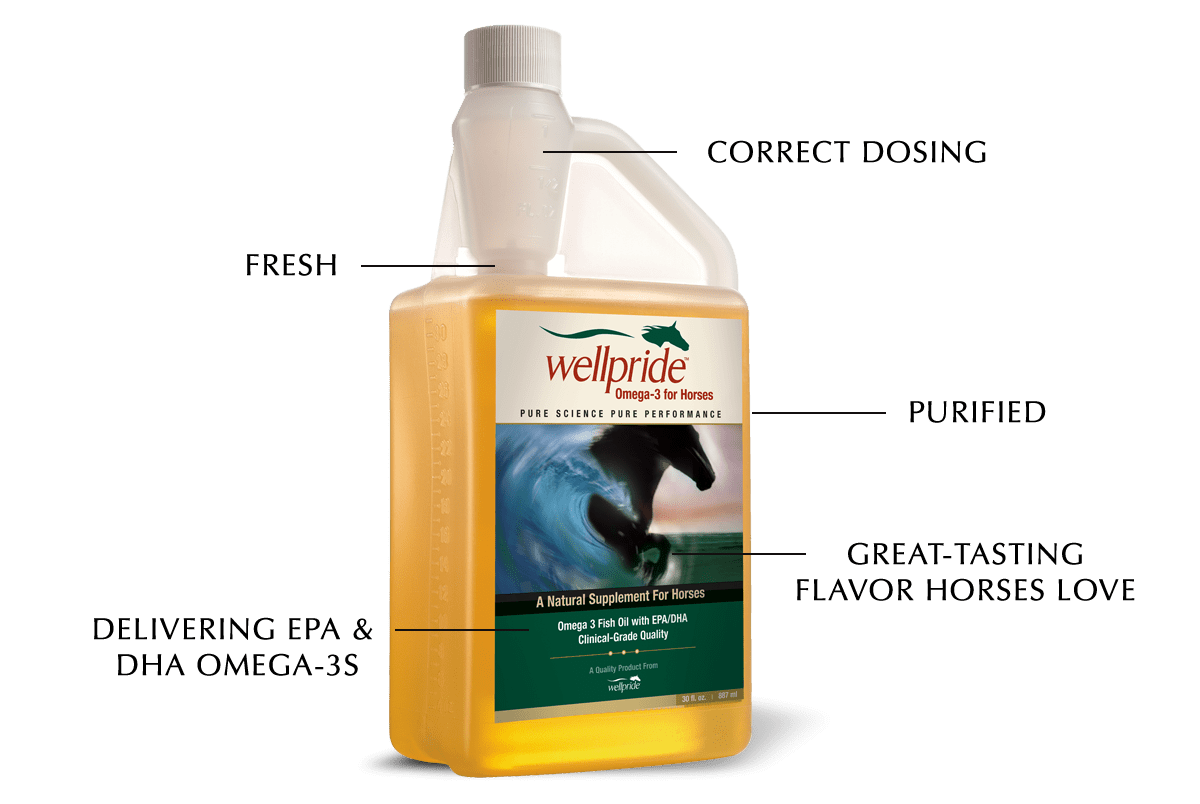Omega-3 for Horses with Allergies & Skin Problems
Whether it’s sweet itch, hives, hot spots, or even sunburns, horse skin conditions can leave your equine partner vulnerable to chronic illnesses, hair loss, and wounds. It can also make your horse pretty miserable and irritated, too.
Skin issues are the last thing we want for our horses, so how can we get them back to their sleek, shiny, and healthy selves? While we always advocate following your veterinarian’s advice, omega-3 for horses with allergies and other skin conditions can have a wonderful impact on dermatological health. It’s also often an excellent adjunct to your horse’s overall treatment plan!
Is Omega-3 Good for Horses with Skin Problems?
Omega-3 supplementation for horses is a worthwhile endeavor. After all, these fatty acids make up an important part of the cell membrane and carry out many vital cellular functions. When it comes to skin health, these cellular functions can directly influence coat luster, skin softness, the integrity of the epidermal barrier, and more (1).
While omega-3 fatty acids are considered “essential,” – meaning horses have to get enough through their diet – most commercial equine feeds contain little to no omega-3s. In many cases, that makes supplementation necessary.
Omega-3s vs. Omega-6s
While both omega-6s and omega-3s are considered essential fatty acids and are necessary for skin health, it’s vital to get a good balance. Consuming an overabundance of omega-6s can fire up the body’s inflammatory response, leading to redness, irritation, warmth, swelling, and poor function.
To cut down on omega-6 intake, avoid sunflower and corn oil for horses. While these oils are often fed to promote coat shine, they’re high in omega-6 fatty acids and can promote inflammation if fed to horses long-term.
Common Horse Skin Conditions
Here’s what we know about omega-3 supplementation and how it can impact common horse skin conditions:
Skin Inflammation
Many skin conditions involve inflammation. Plenty of research shows that omega-3 fatty acids help reduce inflammation when consumed in correct doses.
Notably, omega-3s help reduce leukotriene B4, an inflammatory substance known to promote skin issues like dermatitis (2). Studies also show that the omega-3 fatty acid EPA can help decrease the production of pro-inflammatory AA-derived prostaglandins. This, in turn, can lead to a reduction in the inflammatory response caused by sun exposure (3) and other irritants.
Sweet Itch
Sweet itch – also known as seasonal allergic dermatitis – can be huge pain. Fortunately, there’s research showing omega-3s can help. One 14-week, double-blind, placebo-controlled study found that when horses with sweet itch were fed with an omega-3 supplement, they showed a reduction in allergic response (4).
There is more good news from other animal studies! For instance, a 2016 rat study focusing on pruritus (or itchy skin) found that fish oil supplementation improved skin hydration and significantly reduced itch-related scratching (5).
Hair Loss and Abnormalities
When mammals do not get enough omega-3s, their skin health suffers as a consequence. A dermatologist and hair expert from Germany determined that if a person’s diet is lacking in several components (including essential fatty acids), they have an increased risk of experiencing pigmentation changes, hair loss, or structural abnormalities in the hair (6).
Canine studies find similar patterns; dogs that do not get enough essential fatty acids more frequently have matted and discolored coats, as well as scaly skin (1). Certainly, it stands to reason that horse skin conditions, like hair loss and a dull coat, could also be caused by a lack of omega-3 fatty acids.
Sunburns
Research has shown that fish oil can reduce sun-induced inflammation in humans. Omega-3 fatty acids act as an oxidizable buffer which protects more vital structures from free radical damage (7). Since horses also experience sunburn, fish oil may be able to help horses prevent this sort of inflammation, too.
Wound Healing
Long before scientists discovered omega-3 fatty acids, cod liver oil was known for its wound-healing properties. Today, research has confirmed this benefit. Reviews of the scientific literature show that omega-3 supplements consistently accelerate the healing of skin wounds in rats, pigs, and humans (8).
Horseowner Experiences with Wellpride Fish Oil
Since science shows a clear correlation between omega-3 fish oil and skin health, why not review anecdotal evidence from real horse owners?
John Williams & Carrick

Carrick (ridden by Olympian John Williams) suffered from skin issues and weak hoof walls. Williams stated that – after taking Wellpride for a few months – Carrick saw noteworthy improvements in both issues. On April 17, 2017, Carrick passed away at the impressive age of 25.
Vegas
A 9-year-old Hanoverian/Thoroughbred cross, Vegas struggled with severe sweet itch every summer, losing most of his tail on account of it. His owner, Lee, was desperate to prevent this chronic skin issue and investigated fish oil for horses.
Fortunately, Wellpride put a stop to Vegas’ recurring bouts of sweet itch. Today, Lee says, “His coat is so shiny – he doesn’t even need a fly sheet. He’s never going to go off of Wellpride.”
Foreign Dance
Also known as Ally, Foreign Dance is an off-the-track Thoroughbred who struggled with spookiness, a hoof fracture, digestive issues, and a dull coat. After just a few months on Wellpride, her owner gushed, “Her coat is great! The dust just sweeps right off of it! Everyone comments on how sleek and soft she is…I attribute her coat condition to nothing but the fish oil!”
Choose Quality Omega-3 Oil for Your Horses
With countless stories – and a plethora of scientific backing – it’s unsurprising that many Wellpride customers report a big difference in their horse’s skin and coat health after 8 to 12 weeks of consistent daily use.
With its great flavor, accurate dosing, and high-quality formula, Wellpride is the best omega-3 supplement for horses.
References:
1. Combarros, D., Castilla-Castaño, E., L A Lecru, L. A., Pressanti, C., Amalric, N., & Cadiergues, M. C. (2020). A Prospective, Randomized, Double blind, Placebo-Controlled Evaluation of the Effects of an N-3 Essential Fatty Acids Supplement (Agepi® ω3) on Clinical Signs, and Fatty Acid Concentrations in the Erythrocyte Membrane, Hair Shafts and Skin Surface of Dogs with Poor Quality Coats. Prostaglandins, Leukotrienes & Essential Fatty Acids, 159: 102140.
2. Yoshida, S., Yasutomo, K., & Watanabe, T. (2016). Treatment with DHA/EPA Ameliorates Atopic Dermatitis-Like Skin Disease by Blocking LTB4 Production. The Journal of Medical Investigation, 63(3-4): 187-91.
3. Pilkington, S. M., Watson, R. E., Nicolaou, A., & Rhodes, L. E. (2011). Omega-3 Polyunsaturated Fatty Acids: Photoprotective Macronutrients. Experimental Dermatology, 20(7): 537-43.
4. O’Neill, W., McKee, S., & Clarke, A. (2002). Flaxseed (Linum usitatissimum) Supplementation Associated with Reduced Skin Test Lesional Area in Horses with Culicoides Hypersensitivity. Canadian Journal of Veterinary Research, 66(4): 272-277.
5. Barcelos, R. C. et al. (2015). Oral Supplementation with Fish Oil Reduces Dryness and Pruritus in the Acetone-Induced Dry Skin Rat Model. Journal of Dermatological Science, 79(3): 298-304.
6. Finner, A. M. (2013). Nutrition and Hair: Deficiencies and Supplements. Dermatologic Clinic, 31(1): 167-72.
7. Rhodes, L. E., O’Farrell, S., Jackson, M. J., & Friedmann, P. S. (1994). Dietary Fish-Oil Supplementation in Humans Reduces UVB-Erythemal Sensitivity But Increases Epidermal Lipid Peroxidation. Journal of Investigative Dermatology, 103(2): 151-4.
8. Huang, T. H., Wang, P. W., Yang, S. C., Chou, W. L., & Fang, J. Y. (2018). Cosmetic and Therapeutic Applications of Fish Oil’s Fatty Acids on the Skin. Marine Drugs, 16(8), 256.







Comments (2)
I have a 14.2hh Connemara with serious sweet itch…. I always pray for wind! I feed my dog a deerhound 2 capsules of human cod liver oil and fish oil from Lidls everyday and his coat is gleeming! How much could I give the pony without going over the top? I just don’t want to cause an adverse effect. Thank you.
Hi Catriona! For ponies, we typically recommend between 0.5 – 0.75 oz per day of our Wellpride fish oil. However, for more severe cases of sweet itch, some of our riders have seen better results when they double the daily maintenance dose. For a pony, that would mean aiming for 1 – 1.5 oz daily. Give us a call if you have any other questions! We are here to help. 🙂